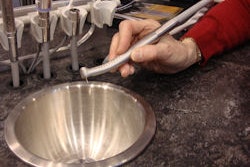
If you can preserve fruit in alcohol, why not your patients' teeth? For the past five years, researchers have been exploring the benefits of alcohol -- specifically ethanol -- when added to tooth preparations before the adhesive and found the technique improves bond strength. Now they wonder if it will work in your office as well.
In one new study, an international group found that composite resin crowns placed after ethanol were 31% more strongly bonded to human dentin after a year's storage in artificial saliva than crowns placed without the ethanol (Dental Materials, April 2010, Vol. 26:4, pp. 380-386).
"It prevents degradation," explained Franklin Tay, B.D.Sc., Ph.D., an associate professor of endodontics at the Medical College of Georgia School of Dentistry and one of the study authors. A key reason why restorations fail is that enzymes already present in the tooth and surrounding liquids attack the collagen in the dentin and the hybrid layer that attaches the dentin to the adhesive.
“It will take another five years. But it's very exciting.”
— Franklin Tay, B.D.Sc., Ph.D.
These matrix metalloproteinases (MMPs) need water to do their damage. Ethanol replaces the water. "By removing the water, you are depriving the MMPs of their working environment," Dr. Tay said. And the procedure has an additional benefit: "By using a chemical dehydrant, you are shrinking the collagen. That creates more space for the resin to flow in."
Why not just blow-dry the dentin? "Once the collagen is exposed to air, the surface tension would cause it to collapse," he said.
Might work for root canals
Researchers are divided on whether to recommend the procedure clinically. Dr. Tay only recommends it for root canals. "The problem is that it's cumbersome, and it takes a long time," he said. "You have to remove all the water."
At the recent American Association for Dental Research (AADR) meeting in Washington, DC, a research group from the University of Iowa tried addressing this problem with an ethanol gel instead of a liquid. But it was hard to know how much gel to apply. "The technique sensitivity was so important that some samples fell apart before they could be tested," said University of Iowa researcher Jeremy Goodson. And in this experiment, the restorations bonded with ethanol were weaker than the ones bonded according to the manufacturers' recommendations.
Dr. Tay thinks endodontics might be a more promising area to employ ethanol. To work, the ethanol must replace all the water in the dentin. In a vital tooth, this is challenging because the tubules continue to supply liquid. In a nonvital tooth, it's much easier to get the dentin dry.
So, for example, if you want to bond inside an endodontically treated tooth, you might try the following procedure:
- Etch the dentin as you normally would.
- Rinse with water. Do not air-dry the dentin.
- Instead, apply 100% ethanol for two to five minutes directly to the moist dentin.
- Apply several coats of primer.
It should be noted, however, that there are no clinical trials to show this works. While some other researchers are pursuing that approach, Dr. Tay is going in a different direction.
Preserving dentin inside a restoration can be done in three ways, he said. Ethanol wet bonding is one. Another is by treating the tooth preparation with chlorhexidine, which inhibits the MMPs.
Remineralization looks promising
The third is to remineralize the dentin, in essence replacing the water with minerals. "This is experimental," said Dr. Tay, who has a National Institutes of Health grant to work on the remineralization strategy. "It will take another five years. But it's very exciting."
One of the processes that degrades dentin is the dissolution of calcium phosphate by the acids used in the adhesive system. "Minerals are lost in 15 seconds, leaving collagen filled with water," Dr. Tay said. Just adding more calcium phosphate onto the tooth doesn't get these minerals where they are needed. You have to include other molecules that guide them into the dentin.
That's the idea behind casein phosphopeptide-amorphous calcium phosphate (CCP-ACP, the active ingredient in MI Paste/Recaldent). But CCP-ACP is designed for enamel and, because of the collagen in the dentin, a different formula is required.
Researchers haven't hit on the ideal formula yet, but they're closing in. If they succeed, dental patients could notice a big difference. The average composite resin restoration lasts only 5.7 years, Dr. Tay noted. "We're hoping by improving the resin bonding mechanism we can increase that life span."
Copyright © 2010 DrBicuspid.com



















